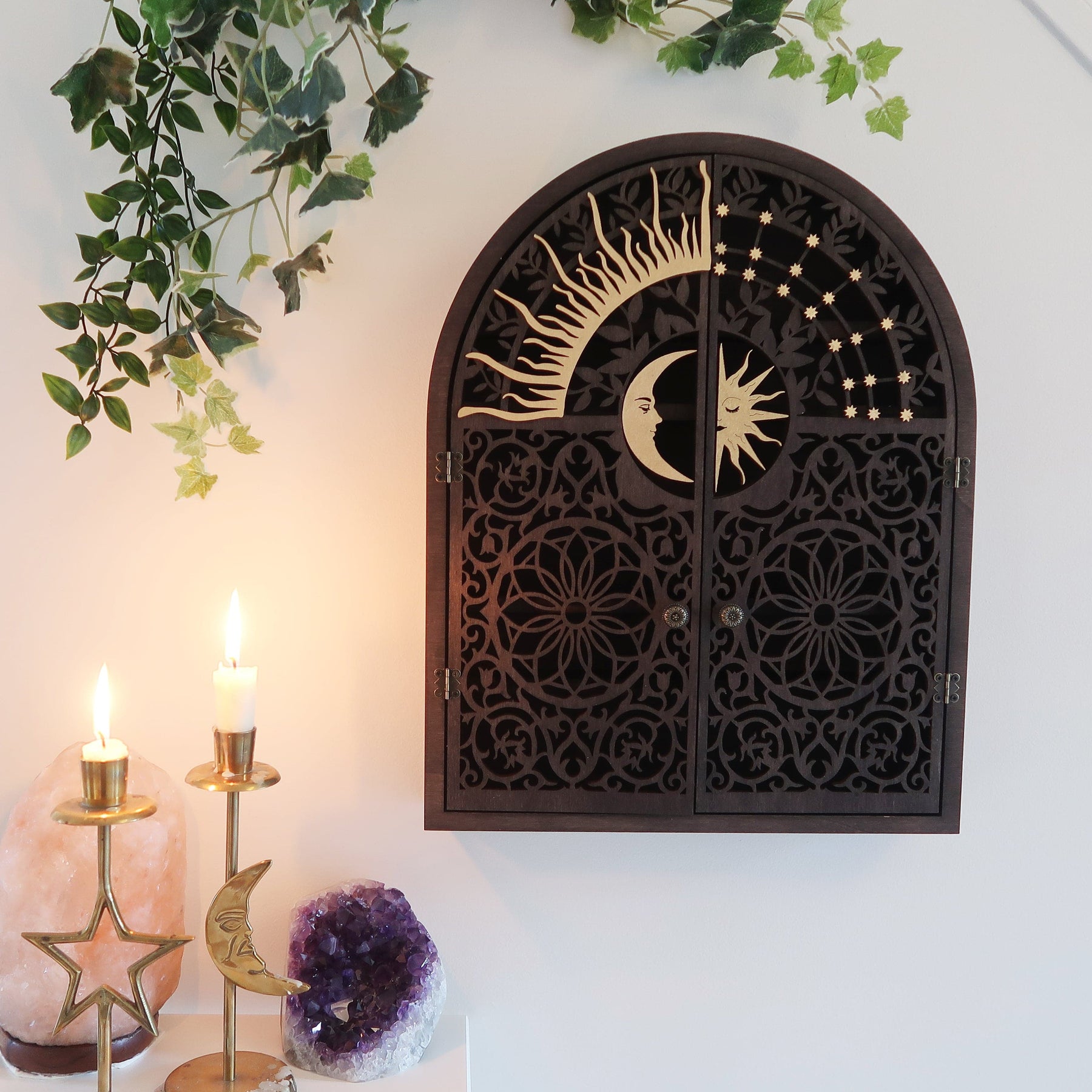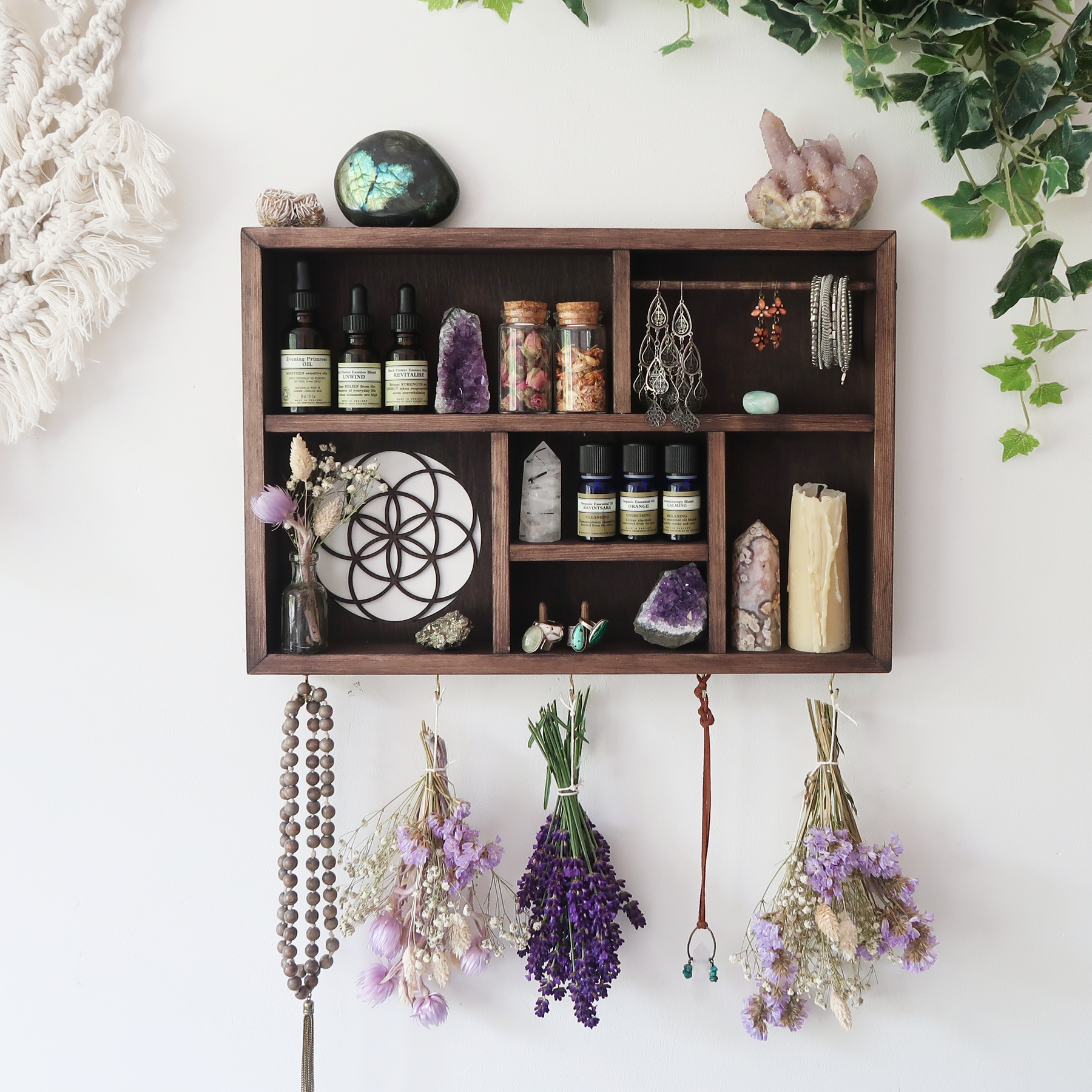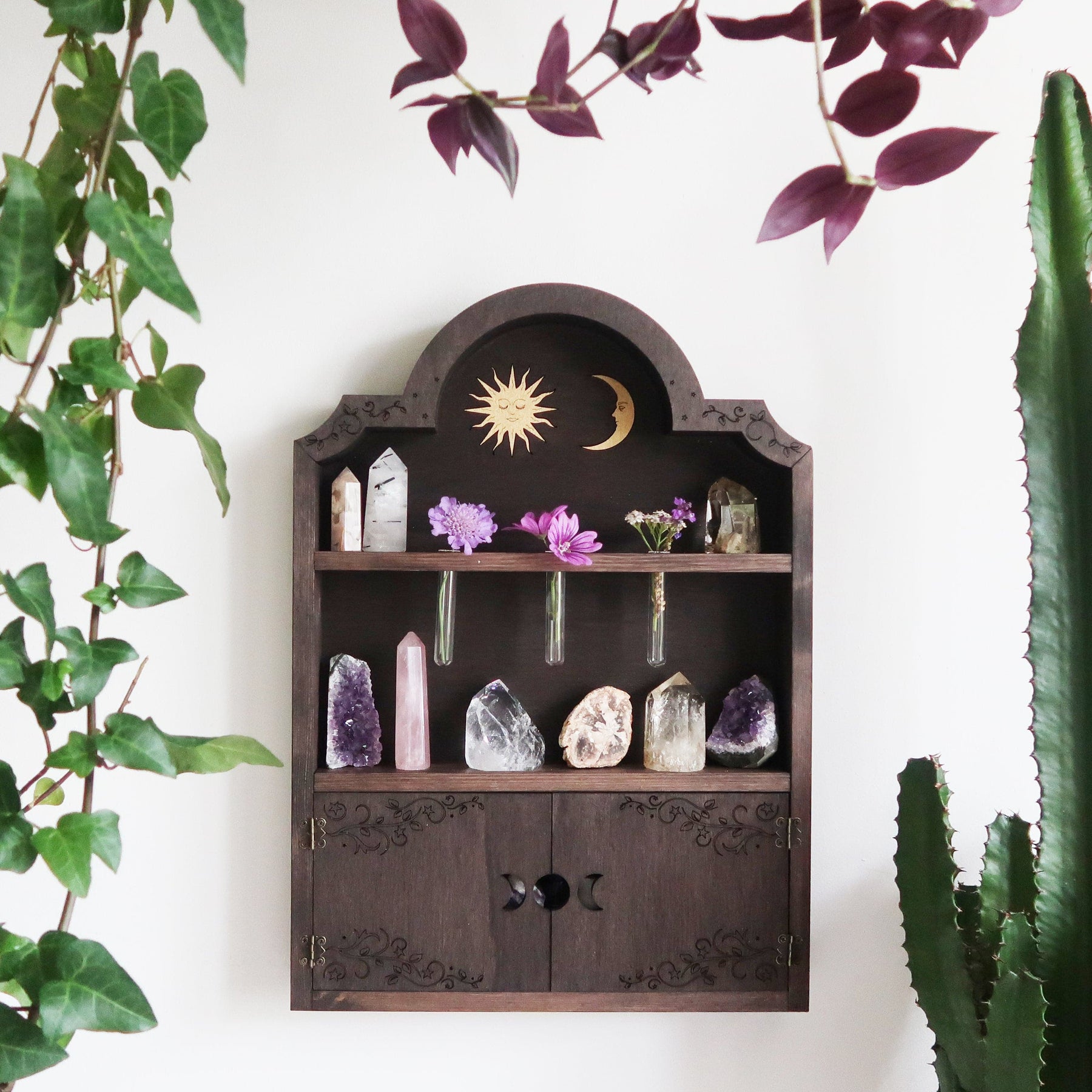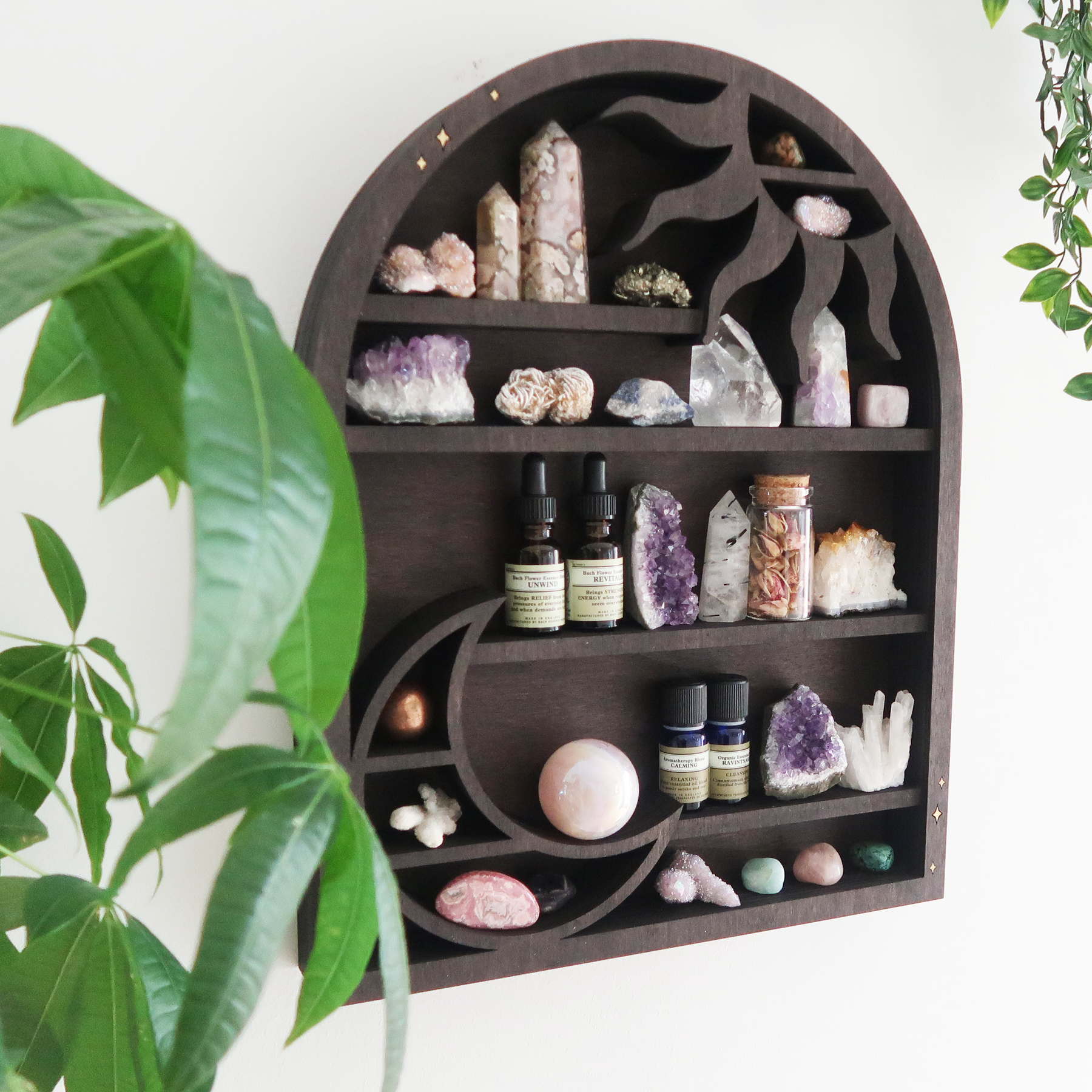12 Essential Apothecary Herbs (For Your Modern Home Cabinet)
Last autumn, while organizing my kitchen pantry, I realized how many store-bought medicines could be supplemented with herbs growing right in my garden. That weekend became a turning point as I established my first modern apothecary collection.
Creating a home apothecary brings ancient wisdom into modern wellness routines.
A well-stocked herb cabinet serves as both a functional wellness center and a beautiful connection to traditional healing practices that have sustained humanity for generations.
1. Lavender: The Versatile Soother
Perhaps the most recognized herb in traditional apothecaries, lavender remains essential in modern herbal collections.
Lavender offers extraordinary versatility, serving as a sleep aid, anxiety reliever, minor burn treatment, and headache remedy all in one beautiful, fragrant herb.
The Sun & Moon Apothecary Cabinet provides the perfect solution with its beautiful design featuring a top shelf for displaying fresh lavender bundles and enclosed storage below for dried buds.
The cabinet's doors keep light-sensitive herbs protected while honoring the connection between herbalism and celestial wisdom.
Uses for lavender:
- Sleep sachet beneath pillows for insomnia
- Lavender tea for anxiety and nervous tension
- Infused oil for minor burns and skin irritation
2. Chamomile: The Gentle Healer
This daisy-like flower with its apple-like fragrance has been a cornerstone of herbal medicine for thousands of years.
Chamomile works wonders as a gentle sedative and digestive aid, making it particularly valuable for stress-related digestive issues and sleep disturbances.
Medicinal uses for chamomile:
- Digestive comfort tea for upset stomachs
- Sleep aid for restless nights
- Skin-soothing compress for irritation
3. Peppermint: The Digestive Dynamo
With its bright flavor and powerful aromatic qualities, peppermint earns its place in every home apothecary.
Peppermint contains menthol, which relaxes digestive tract muscles, eases nausea, and clears congestion while providing a refreshing burst of energy when needed.
Common peppermint preparations:
- Digestive tea for after heavy meals
- Steam inhalation for congestion
- Peppermint-infused oil for headache relief
4. Rosemary: The Memory Enhancer
This aromatic Mediterranean herb offers benefits far beyond the kitchen.
Rosemary improves circulation, enhances memory and concentration, relieves muscle pain, and serves as a natural preservative for other herbal preparations.
I remember working with a client who kept forgetting important appointments. We placed rosemary essential oil in her study, and she reported improved focus and better recall within weeks.
The Sun & Moon Arch Crystal Shelf provides an elegant display space for both dried rosemary bundles and essential oils.
Its celestial design complements the herb's traditional associations with mental clarity.
Best uses for rosemary:
- Memory-enhancing tea during study sessions
- Infused oil for sore muscles and joints
- Hair-strengthening rinse
5. Ginger: The Warming Wonder
No apothecary would be complete without the warming, circulation-boosting power of ginger.
Ginger's warming compounds make it invaluable for poor circulation, nausea, joint inflammation, and immune support during cold seasons.
Therapeutic applications:
- Anti-nausea tea for motion discomfort
- Warming infusion for poor circulation
- Immune-supporting honey infusion
6. Echinacea: The Immune Supporter
Native American tribes used echinacea long before European settlers discovered its benefits.
Echinacea stimulates immune system function, potentially reducing the duration and severity of colds while supporting the body's natural defense mechanisms.
Ways to incorporate echinacea:
- Preventative tincture during cold and flu season
- Throat-soothing tea at first sign of illness
- Immune-supporting capsules for travel
7. Calendula: The Skin Healer
With its cheerful orange petals, calendula brings both beauty and powerful healing properties to your apothecary.
Calendula possesses remarkable skin-healing abilities, reducing inflammation, soothing burns, healing wounds, and calming irritated skin conditions.
The Celestial Arch Cabinet creates the perfect storage solution for calendula preparations.
 Its intricate mandala design mirrors the radiant pattern of calendula flowers, while the enclosed cabinet protects light-sensitive oils and salves.
Its intricate mandala design mirrors the radiant pattern of calendula flowers, while the enclosed cabinet protects light-sensitive oils and salves.
Best preparations for calendula:
- Skin-healing salve for minor wounds
- Infused oil for sensitive skin
- Gentle face wash for acne-prone skin
8. Lemon Balm: The Mood Lifter
This lemon-scented member of the mint family brings calm and joy to any home apothecary.
Lemon balm gently elevates mood while calming nervous tension, making it particularly valuable for anxiety that manifests with digestive upset.
Therapeutic uses:
- Anxiety-reducing tea blend
- Sleep-promoting evening infusion
- Cold sore treatment when applied topically
9. Elderberry: The Immune Booster
Revered in folk traditions across Europe, elderberry has experienced a well-deserved revival in modern herbalism.
Elderberry contains compounds that prevent certain viruses from replicating in the body, potentially reducing the duration of colds and flu.
Ways to use elderberry:
- Immune-supporting syrup during winter months
- Throat-soothing tea with honey
- Fever-reducing elder flower infusion
10. Thyme: The Respiratory Helper
This common kitchen herb doubles as a powerful medicinal ally, especially for respiratory conditions.
Thyme contains thymol, a compound with powerful antimicrobial properties that helps fight respiratory infections while loosening congestion and calming coughs.
Therapeutic applications:
- Respiratory-supporting steam inhalation
- Antimicrobial gargle for sore throats
- Expectorant tea for productive coughs
11. Mullein: The Lung Supporter
With its tall stalk and soft, fuzzy leaves, mullein has been used for centuries to support respiratory health.
Mullein soothes irritated respiratory tissues, helps expel excess mucus, and reduces inflammation in the lungs and throat.
Best uses for mullein:
- Respiratory support tea during cold season
- Soothing throat and lung infusion
- Ear oil (when combined with garlic) for ear discomfort
12. Holy Basil (Tulsi): The Adaptogenic Balancer
Revered in Ayurvedic traditions as "The Incomparable One," holy basil deserves a place in modern apothecaries.
Holy basil functions as an adaptogen, helping the body respond to physical and emotional stress while supporting immune function and promoting mental clarity.
Adaptogenic applications:
- Stress-reducing daily tea
- Immune-supporting infusion during challenging times
- Focus-enhancing preparation for work or study
Storage and Use Tips
Creating an effective home apothecary requires proper storage to maintain herbal potency:
- Store dried herbs in amber glass jars away from direct sunlight
- Label everything with herb name and date
- Keep herbs in cool, dry locations
- Use within 6-12 months for most dried herbs
A beautiful storage solution like the Sun & Moon Apothecary Cabinet not only preserves your herbs but also honors the sacred tradition of herbal healing, bringing both functionality and beauty to your wellness practice.

About the Author
Janie Fagan is the lead writer and resident crystal expert at Coppermoon.
With over 20 years of experience in spiritual practices and crystal work, Janie comes from a lineage of spiritualists who have passed down their wisdom through generations.
Her approach combines traditional knowledge with practical, modern applications, helping readers create sacred spaces that honor both ancient traditions and contemporary needs.
When not writing or working with crystals, Janie can be found tending to her moon garden, practicing sound healing, and exploring the connection between celestial movements and earth energies.
She believes that everyone deserves access to the tools and knowledge that make spiritual practice accessible and meaningful in everyday life.





Leave a comment